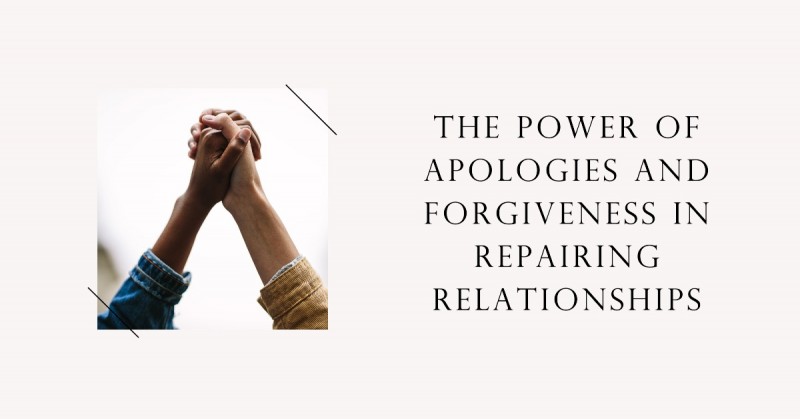
In our journey through life, we inevitably encounter conflicts and disagreements in our relationships. These conflicts can cause deep wounds, leading to broken trust, resentment, and emotional pain. However, there is a powerful tool that has the potential to heal these wounds and restore harmony in relationships: apologies and forgiveness. In this article, we will explore the significance of apologies and forgiveness, their role in repairing relationships, and how they contribute to personal growth and emotional well-being.
When conflicts arise, emotions run high, and relationships suffer. Apologies and forgiveness offer a ray of hope in these challenging moments. Apologies acknowledge the hurt caused, while forgiveness allows us to let go of the pain and resentment. Together, they have the potential to mend broken bonds, foster understanding, and pave the way for a healthier, more fulfilling connection.
- Recognizing the Need for Apologies
Apologies hold tremendous significance in repairing relationships. They serve as a bridge between the past and the future, allowing us to address our mistakes and take responsibility for our actions. By recognizing the need for apologies, we open ourselves up to growth and transformation.
- Sincere Apologies: The Key to Reconciliation
A sincere apology goes beyond mere words. It involves genuine remorse, taking accountability, and expressing empathy towards the hurt party. When we offer sincere apologies, we demonstrate our willingness to repair the damage and rebuild trust, creating the foundation for reconciliation.
- Restoring Trust Through Apologies
Trust is fragile and easily shattered in the face of conflict. Apologies play a vital role in restoring trust. When we apologize, we show our commitment to change and demonstrate that we value the relationship. Trust slowly rebuilds as the hurt party witnesses our consistent efforts to make amends.
- The Act of Forgiveness: A Gift to Yourself
Forgiveness is a profound act of self-liberation. By forgiving, we release ourselves from the burden of carrying anger, resentment, and bitterness. It does not condone the wrongs committed but frees us from their emotional hold, allowing us to move forward with a lighter heart and a renewed sense of peace.
- Breaking Free from Resentment and Bitterness
Resentment and bitterness are toxic emotions that poison relationships. Forgiveness provides the antidote to these destructive feelings. When we forgive, we choose to let go of the negative emotions that hold us captive, enabling us to cultivate compassion and create a more positive environment for healing.
- Rebuilding Stronger Connections with Forgiveness
Forgiveness is a catalyst for rebuilding relationships on a stronger foundation. It opens the door to vulnerability, empathy, and understanding. Through forgiveness, we create space for growth, acceptance, and the possibility of deeper connections based on mutual respect and appreciation.
- Apologies as a Catalyst for Forgiveness
Apologies set the stage for forgiveness. When we genuinely apologize, we acknowledge the pain we have caused, demonstrating our commitment to making things right. This act of vulnerability and accountability often paves the way for the injured party to embrace forgiveness and embark on a journey of healing.
- The Role of Empathy in Forgiveness
Empathy is a crucial ingredient in the process of forgiveness. When we put ourselves in the shoes of the person who hurt us, we gain a deeper understanding of their intentions, struggles, and humanity. This understanding fosters empathy, making forgiveness a more accessible and compassionate choice.
- Moving Forward: Rebuilding Relationships
Apologies and forgiveness are not quick fixes but rather stepping stones toward rebuilding relationships. They require ongoing effort, open communication, and a shared commitment to growth. By learning from past mistakes and embracing forgiveness, we create an opportunity for stronger, more resilient connections.
- Cultivating Emotional Intelligence
Apologies and forgiveness are integral to emotional intelligence. They allow us to recognize and regulate our emotions, navigate conflicts with grace, and develop healthier responses to challenging situations. By engaging in these practices, we cultivate self-awareness, empathy, and a deeper understanding of ourselves and others.
- Developing Empathy and Compassion
Apologies and forgiveness promote the development of empathy and compassion. Through apologies, we acknowledge the pain we have caused others, enabling us to empathize with their experience. Forgiveness, on the other hand, nurtures compassion by encouraging us to extend understanding and kindness to those who have hurt us.
- Strengthening Emotional Resilience
Apologies and forgiveness contribute to emotional resilience. They empower us to confront our mistakes, take ownership of our actions, and bounce back from conflicts with resilience and grace. By embracing these practices, we cultivate inner strength and equip ourselves with valuable tools for navigating the complexities of relationships.
6. Conclusion
Apologies and forgiveness possess transformative power in repairing relationships. They bridge the gap between hurt and healing, mistrust and trust, and resentment and compassion. Through sincere apologies, we acknowledge our mistakes and demonstrate our commitment to change. Through forgiveness, we liberate ourselves from the emotional burdens that hold us back and create space for growth and stronger connections. Let us embrace the power of apologies and forgiveness as catalysts for repairing, nurturing, and thriving in our relationships.
From Innocence to Enlightenment: Exploring the Concept of Bal Brahmacharya in Hindu Religion